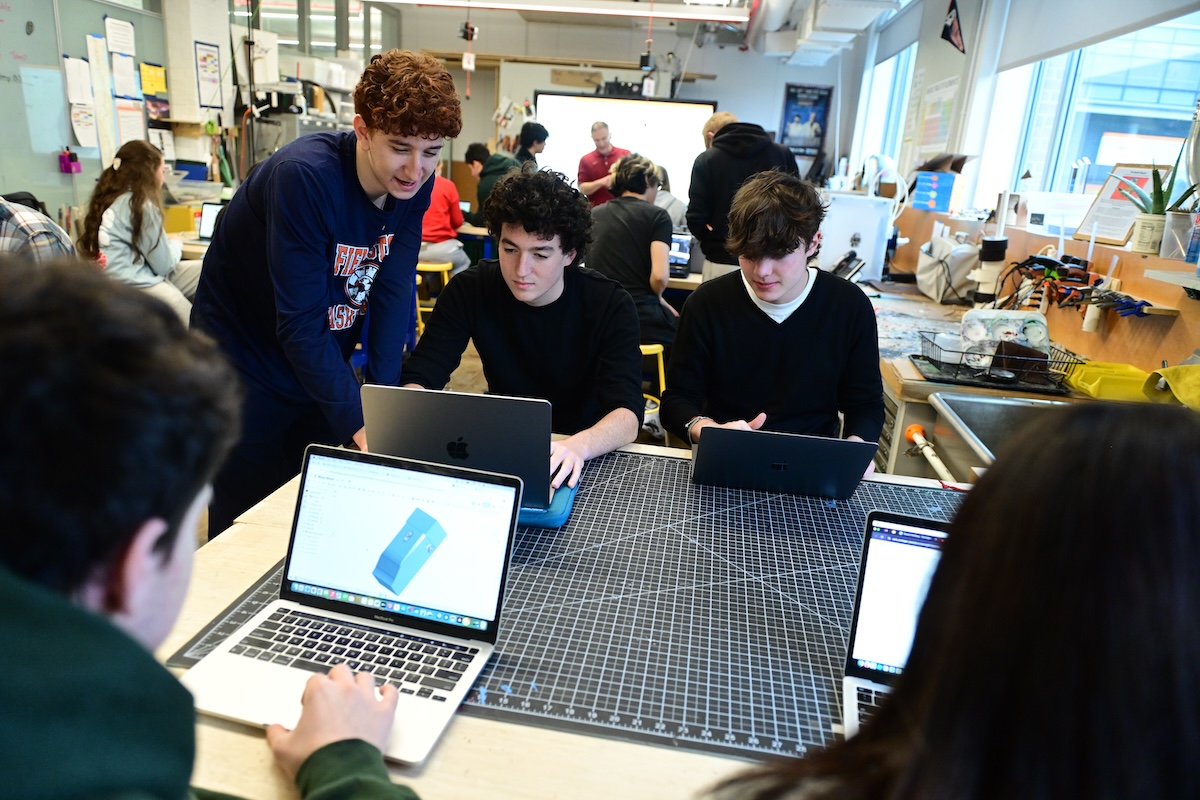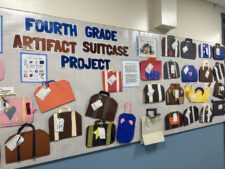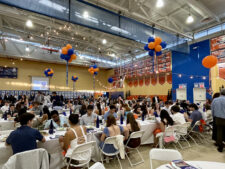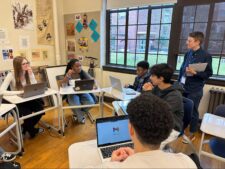This story was originally published in the June 2025 edition of the ECFS Reporter.
How STEM education at ECFS prepares students for a lifetime of leadership
At the Ethical Culture Fieldston School, science, technology, engineering, and math (STEM) education offers a dynamic testing ground for innovation, discovery, and ethical engagement. From their earliest years, our students engage with critical questions, grapple with complex ideas, and connect what they study in the classroom with the world at large. Whether they’re designing experiments in a biology lab, constructing climate-conscious structures, modeling lunar exploration, or discovering patterns in math, ECFS students are innovators and problem-solvers, tackling complex subject matter every day.
Science at Fieldston Upper
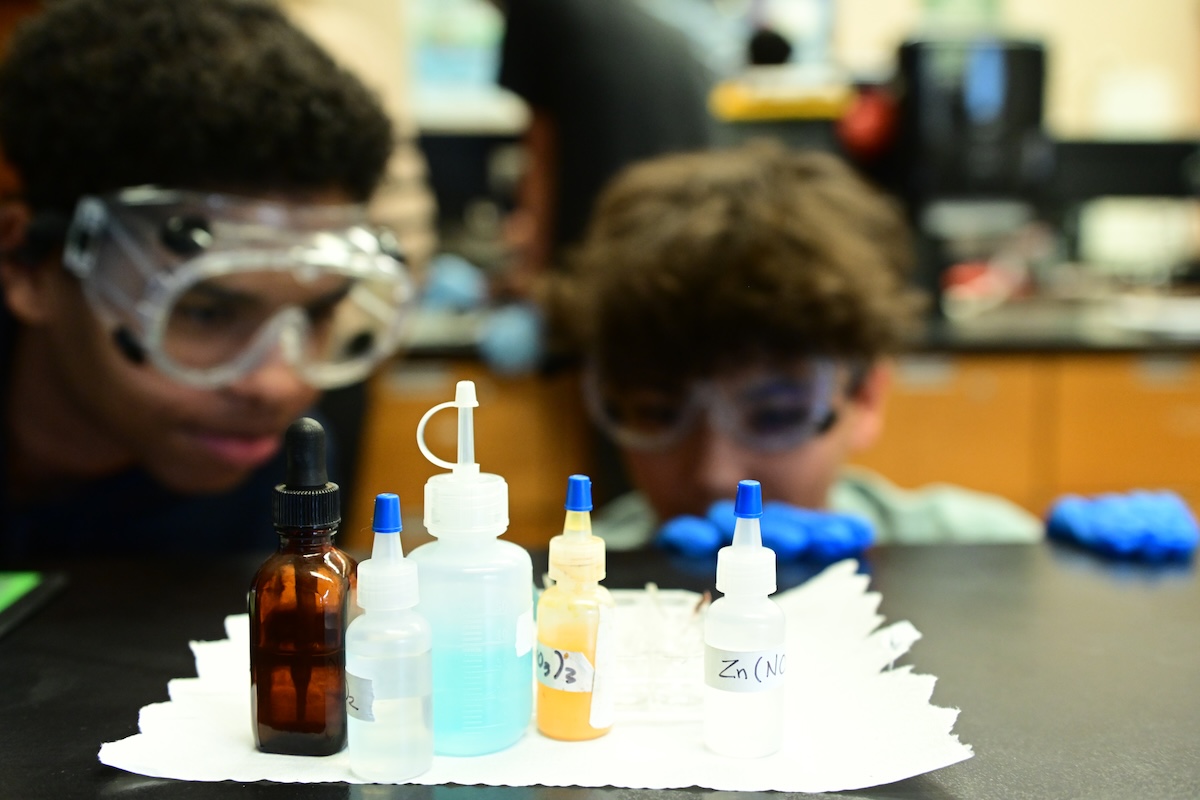
Students develop their scientific knowledge through yearlong lab courses and investigate specific disciplines with semester-long electives designed by the Science Department. Laboratory courses emphasize hands-on experimentation, encouraging students to explore real-world applications and consider future paths in scientific research.
“The Science Department offers a sequence of introductory laboratory courses that emphasize the major subject areas in science and center on critical thinking and data analysis,” says Fieldston Upper Science Department Chair Paul Church. “These foundational courses prepare students to solve complex problems by providing them with the tools to examine and address complicated systems by taking into consideration multiple perspectives.”
I was the only high schooler in a room full of undergraduate and graduate students, but I was welcomed like any other co-worker, and that pushed me to contribute like one.
What distinguishes the curriculum is how experiments grow in complexity and precision as students progress from biology to chemistry to physics, with each course building on prior knowledge in a logical and cumulative manner. In 9th Grade biology, students learn foundational topics such as cell biology, genetics, evolution, ecosystems, and human anatomy and become proficient in using lab tools, including probes to measure variables like carbon dioxide or oxygen concentrations.
“Each course introduces foundational concepts that are later expanded upon in greater depth, reinforcing scientific thinking and problem-solving skills,” Church explains. “We emphasize the ability to not only perform statistical analysis but also comprehend that analysis.”
Early exposure to rigorous laboratory practices often inspires students to pursue and apply for advanced research opportunities. The Fieldston Upper Science Research Program (FSRP) is designed for highly motivated independent learners who are eager to explore scientific research. Over the course of two to three years, and often including a summer research component, students accepted into the program familiarize themselves with advanced laboratory methods, experimental design, scientific writing, and data analysis. The program also encourages students to independently pursue research opportunities, honing their self-sufficiency and preparing them for the professional world.
“Labs have always been my favorite part of science class,” says FSRP student Zachary L. ’26. “From pig dissections in biology to making aspirin in chemistry, I always got a lot out of the lab portion. My love for experiments is what pushed me to explore this further in the FSRP.”
“Engaging with research in my 9th Grade biology class influenced me to join the FSRP,” says Nathan R. ’25, now in his third year of the program as a Glen de Vries ’90 Science Research Fellow. “That initial experience sparked my interest in studying biology, which is my intended college major. Later, participating in professional research gave me a unique appreciation for the scientific process and the problem-solving that happens in the lab. These skills, more than anything else, are what I’ll take with me in the future.”
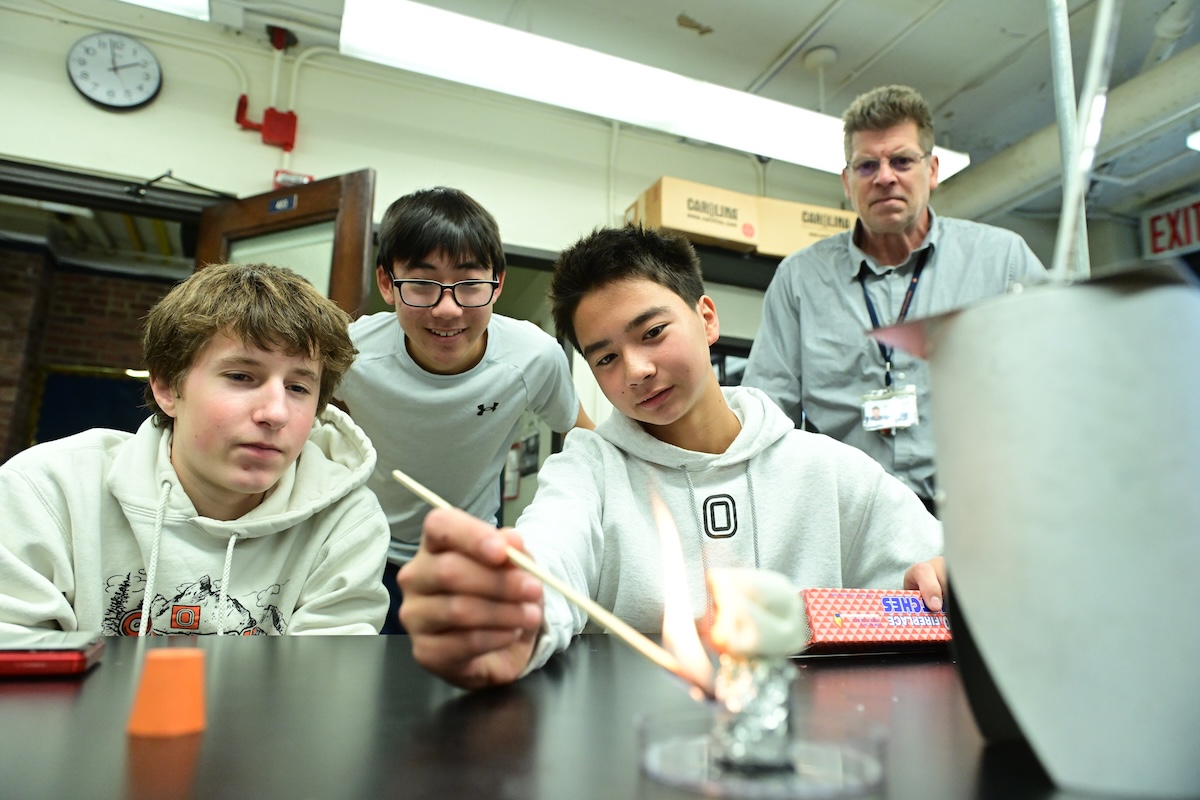
Science Research Fellow Dahlia Z. ’25 also learned beneficial lessons working in a lab setting. “Through FSRP, I spent two summers working in a chemical engineering lab,” she recalls. “I was the only high schooler in a room full of undergraduate and graduate students, but I was welcomed like any other co-worker, and that pushed me to contribute like one. I learned skills I could bring directly back to the classroom and became more confident in asking questions.”
In the Fieldston Upper labs, students in chemistry, physics, and biology draw connections between their science research and technology, as well as math and engineering. Our faculty teaches students that science is a truly multidisciplinary field, encompassing everything from the application of innovative technology to the use of statistical analysis.
In science classes, ECFS students are learning more than how to correctly identify the parts of a cell or the formula for velocity — they’re learning collaboration, problem-solving, and leadership skills that will aid them in becoming expansive innovators.
FSRP student Liam K. ’26 knows that scientific research isn’t just about the experiments, saying, “Lab work demands constant innovation to solve the problems that arise. Learning how to work effectively as a team to overcome these obstacles has been invaluable.”
“Science touches every aspect of our lives and society,” says Church. “The ability to analyze and apply data is essential for participating as an active, informed citizen in today’s world. Many of the solutions to our biggest challenges hinge upon a robust and thoughtful application of science.”
Technology at Fieldston Lower
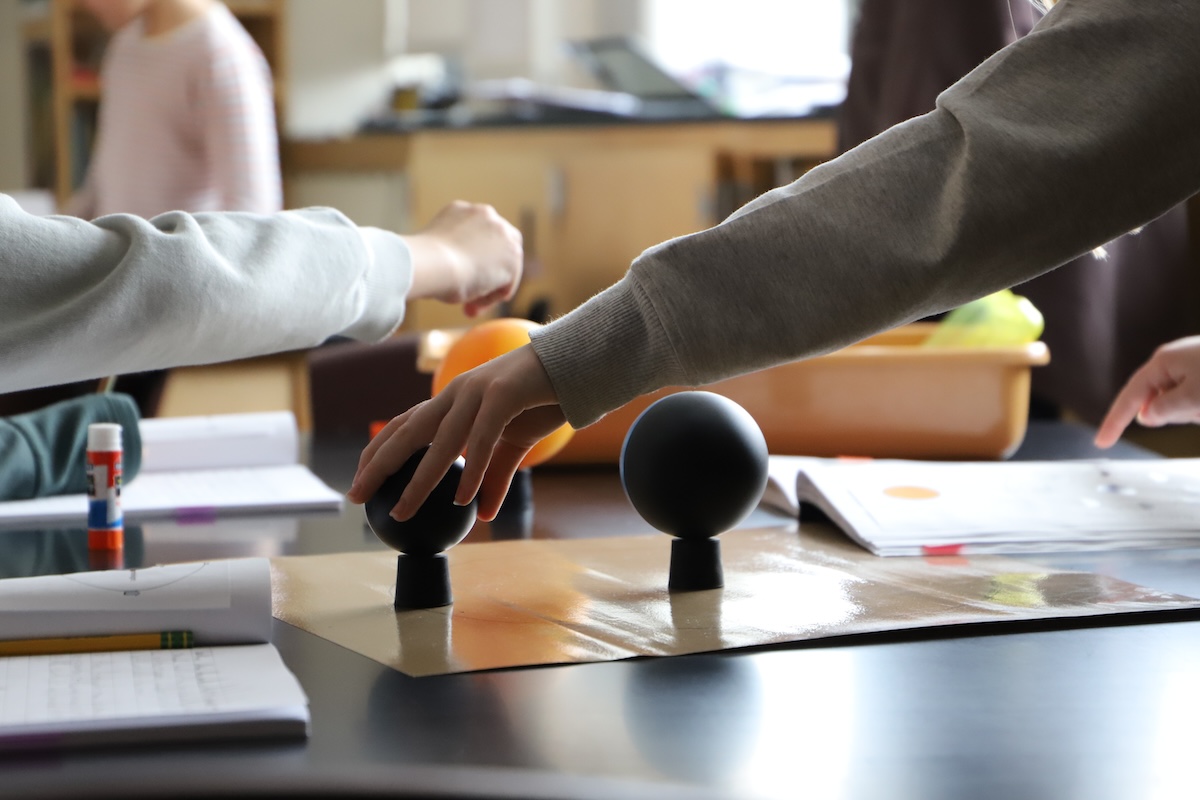
Our youngest students learn about the possibilities of technology and how this shapes their identity as global citizens. Developing technological literacy and curiosity is a cornerstone of an ECFS education, especially as students discover new ways to use technology ethically and incorporate it into both their daily lives and experiential learning projects.
Projects like Fieldston Lower 4th Grade’s “Ice Quest” unit challenge students to innovate with, rather than simply use, technology. Through hands-on experimentation, students are tasked with solving a real-world problem, albeit one that might seem alien to the average person:
building a rover to collect data from the lunar surface.
The project, a collaboration between Fieldston Lower Math and Science Teacher Michael Wilkinson and Ethics and Technology Lead Kim Deveaux, is modeled on research conducted by NASA’s Jet Propulsion Laboratory (JPL), including an ongoing lunar rover mission. Creating a connection to the technology used by NASA scientists engages students in the stakes of their work, Wilkinson explains, commenting, “Immersive projects give context to the skills and content in which students are engaged and learning. This transforms technology into a tool, a means to an end, a way to solve a problem, rather than being the end point.”
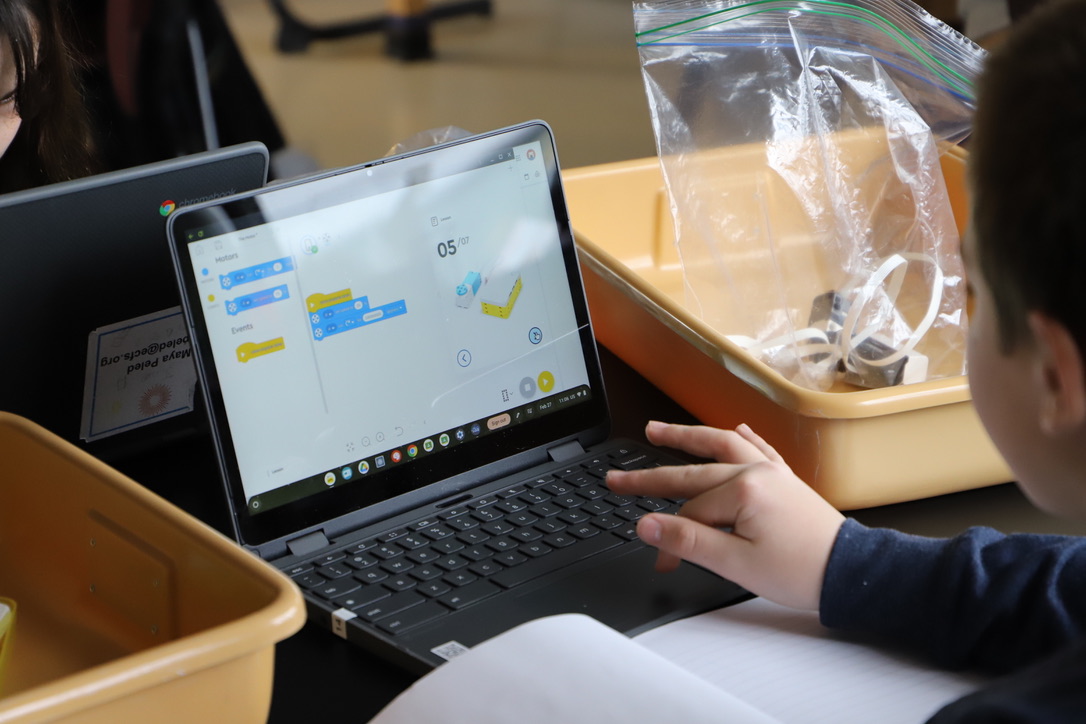
Using the LEGO Education SPIKE toolkit, 4th Graders build and program a rover designed to collect data from a mock lunar surface set up on the floor of the Adler Lab. However, this is far from their first exposure to coding and integrating math, science, and engineering with technology. “Every year, starting in Kindergarten, there’s the Week of Code, which is a Math and Technology collaboration,” explains Deveaux. “This is a culminating project that 4th Grade students do after learning about coding concepts and different coding platforms.” By the time 4th Graders begin building their rovers, they’re adept at learning a new coding language — the kind of flexibility that is essential in becoming innovators with new technology.
Building the rovers is a joyful experience as students experiment with various sensors, configurations, and mission objectives. Initially, they learn simple code sequences that allow them to program lit-up images on the body of their rover. One lesson buzzed with excitement as students showed their peers the different symbols they created — everything from a smiley face to a heart to their own initials — and supported each other as they attempted increasingly complex shapes.
Immersive projects give context to the skills and content in which students are engaged and learning.
After learning the foundations of the LEGO SPIKE system, students dive into the real innovation: trialing different code sequences and rover builds. While technology is essential for a successful mission, Deveaux and Wilkinson intentionally integrate elements from other scientific disciplines, sharing, “In this project, students use previous experiences and knowledge of the moon to help them to design their rover — the technological solution — and also to shape their plan for how and where to search for the data they are seeking.”
As with any new technology, there is a period of trial and error. Rather than letting students feel discouraged, Wilkinson encourages them to take big swings, repeating the refrain that this experimentation is the process every scientist undertakes when conducting innovative research.
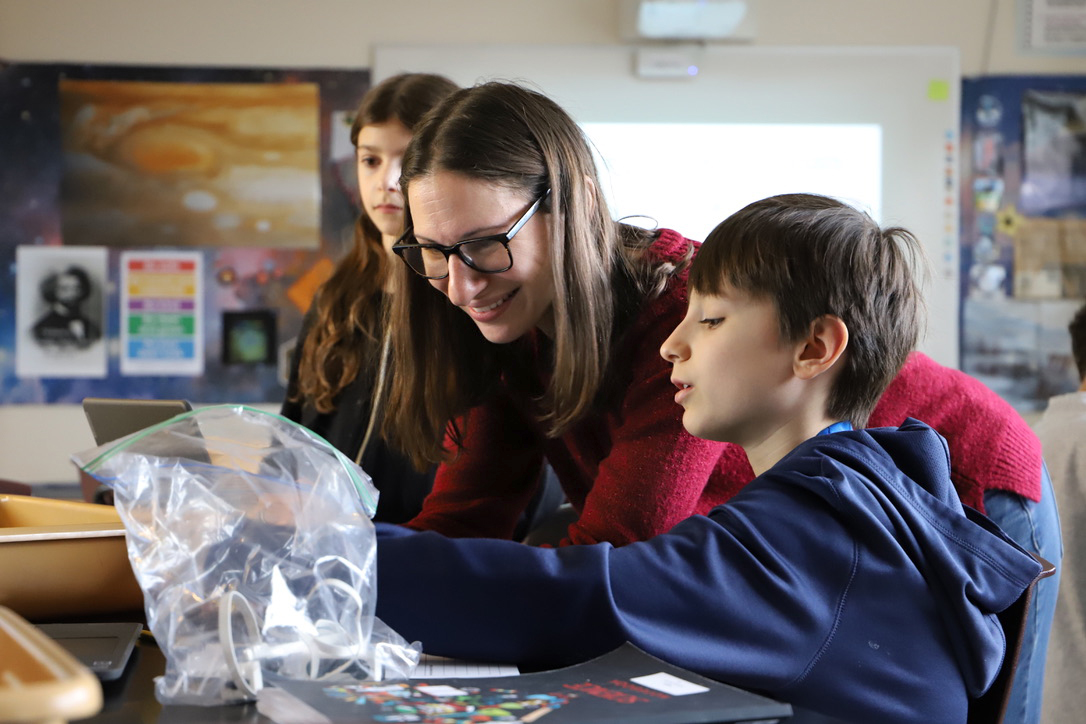
In 2024, students had the unique opportunity to speak with the NASA JPL scientists whose work on lunar rovers parallels their own. After flying their “missions” in the classroom, students hopped on a video call to compare notes with engineers, programmers, and research scientists who were waiting for mission clearance. Wilkinson was excited about the potential for reciprocal learning, remarking, “Our engineers had flown their missions, so by talking to their engineers who’ve gone through all the design build and testing and are waiting for their ride to the moon, each team was really able to appreciate what the other was doing.” Fieldston Lower students gained experience that enabled them to empathize with the unique challenges these scientists face, from budget and weight constraints to navigating complex code.
“It wasn’t just talking heads at the kids,” reflects Wilkinson. “It was really a colloquium, which is exactly what we had hoped to achieve.” As students conduct increasingly complex scientific research in higher grades, they’ll continue that conversation, drawing on a foundation of research, experimentation, and curiosity as they expand their STEM skills.
Engineering at Fieldston Middle
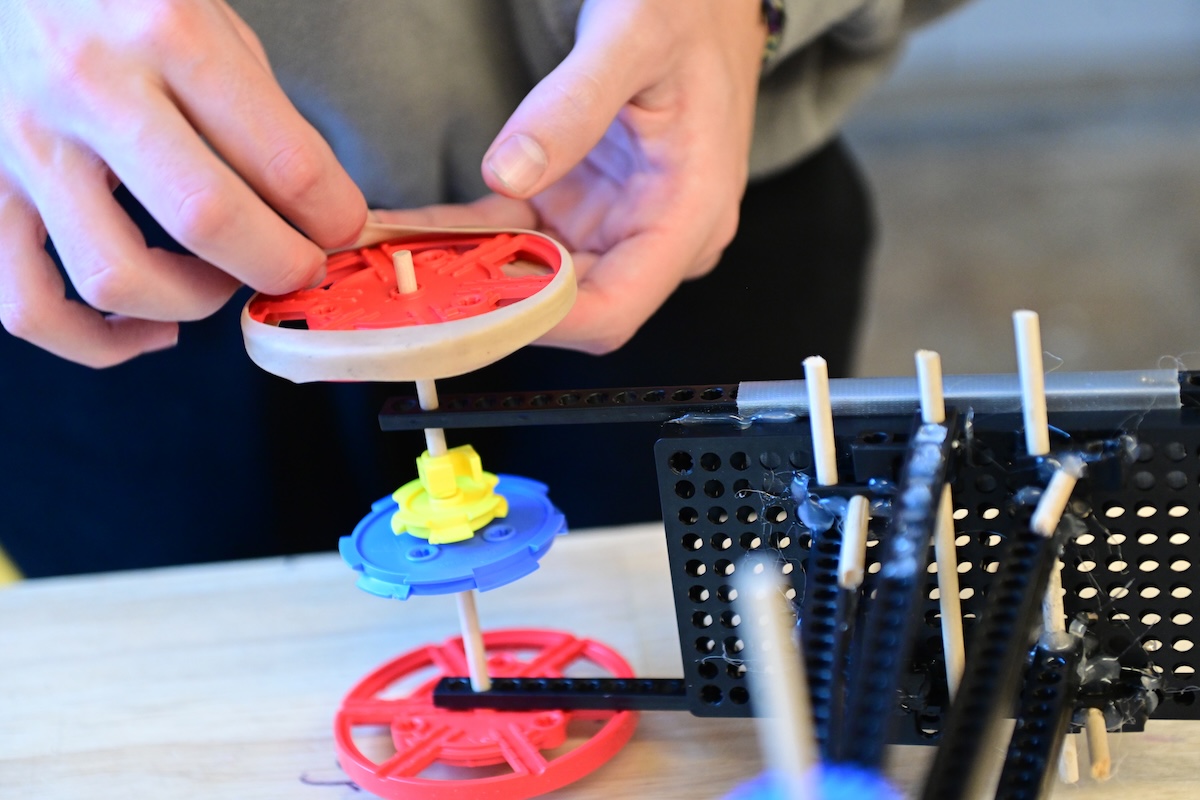
After their foundational introduction to technological innovation at the lower schools, students enter Fieldston Middle with the option to pursue engineering, joining a program that celebrates its 10th anniversary this year. First explored in 6th Grade’s team-taught science course that integrates intentional, multifaceted insights into ethics, engineering classes focus on implementing design features for adapting to climate change effects and constructing climate-friendly houses.
In 7th Grade, students who continue with engineering learn how to think like an engineer. They begin by exploring basic materials like cardboard and sticks with simple tools before gradually progressing to applying more sophisticated techniques as they experiment with robotics and carpentry projects. “I’m happy when 7th Graders come away thinking, ‘What is a prototype? How do you iterate? How do you work with others as a team?’” says Engineering Teacher John Baglio, noting that as students familiarize themselves with these methods, “this room starts to feel like their room.”
Student testimonials underscore the program’s impact. Maddie R. ’29 explains, “I was inspired to take engineering because of my love of science and math. I was surprised by how much freedom we had to discover more about subjects like coding, art, and architecture.”
Reflecting on her final 7th Grade project, Sahaana M. ’29 recalls, “We asked other teachers what we could do to help them, and it felt like I was truly helping someone make an impact on the world. Engineering is about finding solutions to different real-world problems, which can make a difference in someone’s life.”
The key 8th Grade project involves building a cardboard chair, which requires prototyping and scaling processes before physical construction begins. This aligns with the 8th Grade engineering goal of enhancing existing skills and attention to detail.
Maddie noted the project’s impact on her engineering process, saying, “This project taught me the importance of detailed planning with steps such as sketching a design, building a prototype, and then planning how we will use our allotted amount of materials.”
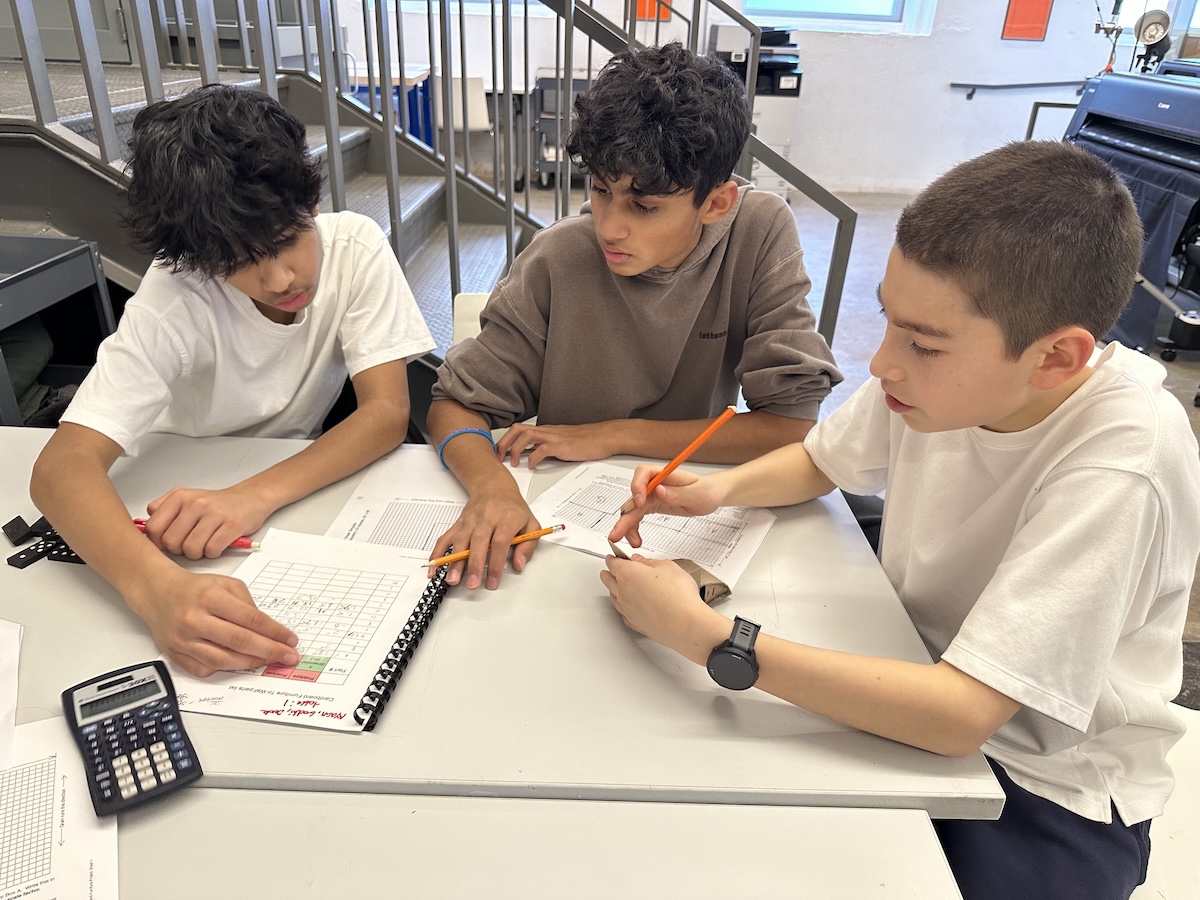
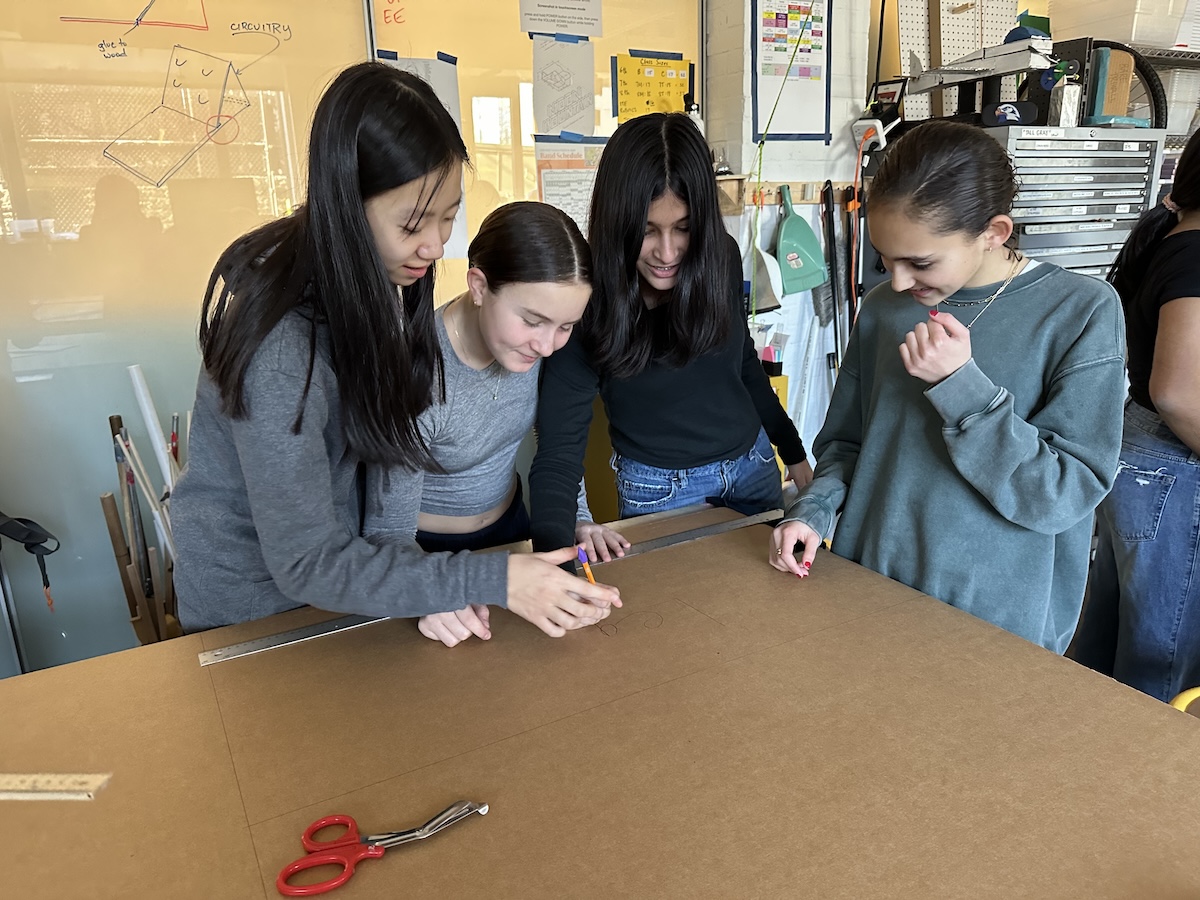
“It’s a class environment that’s unlike others,” Baglio explains. “Engineering has a reciprocal relationship with science, and when students are in engineering, they see the practical applications of things they’ve learned about in science.”
“Engineering is a space where we’re allowed to be creative without being stressed,” adds Shehrzad K. ’29. “We are also able to learn better problem-solving skills, which is helpful in other classes.”
Fieldston Middle Principal Jon Alschuler has seen the impact of the engineering program firsthand. “We now have students giving up their study hall time to take the elective offering and recess time to participate in engineering clubs. Engineering exposure helps students consolidate their knowledge in a very powerful way.”
Thanks to the program’s longevity, Baglio has seen many students continue engineering at Fieldston Upper, with some joining advanced initiatives like the national award-winning Rube Goldberg club and robotics teams to further cultivate their interests. This year, Kai KS. ’25, Nate S. ’25, and Daniel B. ’25 served as teaching assistants (TAs) for a Fieldston Upper robotics class, a culmination of their ECFS engineering experience.
“Our engineering journey began at Ethical Culture in engineering class,” the group of seniors share. “We learned about Mindstorms LEGO robots and fell in love with the engineering process. The potential of what could be built hooked us immediately.” After continuing their learning in Fieldston Middle classes with Baglio, the students were inspired to start a FIRST Tech Challenge robotics team in 8th Grade. As their engineering skills grew, so did their success — the team has accrued upward of 30 regional awards!
Eager to give back, the students approached Baglio looking for new opportunities during their senior year. In addition to creating a second robotics team of 20 9th Graders, they began as TAs for 17 students in the Advanced Robotics and Fabrication course, developing course materials for computer-aided design, micro:bit robotics, and the design process.
“Engineering has taught us so much about ourselves as individual learners,” they say. “The first and often most important thing to remember is the engineering design process: brainstorm, design, build, break, redesign. This process is just as important to everything else as a learner.”
Engineering has a reciprocal relationship with science, and when students are in engineering, they see the practical applications of things they’ve learned about in science.
All three seniors plan to pursue engineering fields in college, and their Fieldston Middle peers are already considering how engineering can support their future careers. Samir G. ’29 shares, “Engineering is helpful if I pursue a career in civil, biomedical, or computer engineering or work on innovative projects benefiting society, such as clean and efficient transportation systems or agricultural and water irrigation projects that could potentially solve world hunger.”
“I talk about engineering as working toward a concept of agency,” Baglio says. “‘You can do it; you can figure this out.’ I hope that this carries over into students feeling more empowered in their lives outside school, whether it’s confronting climate issues or politics or using these problem-solving skills to make them feel more capable in an uncertain world.”
Math at Ethical Culture
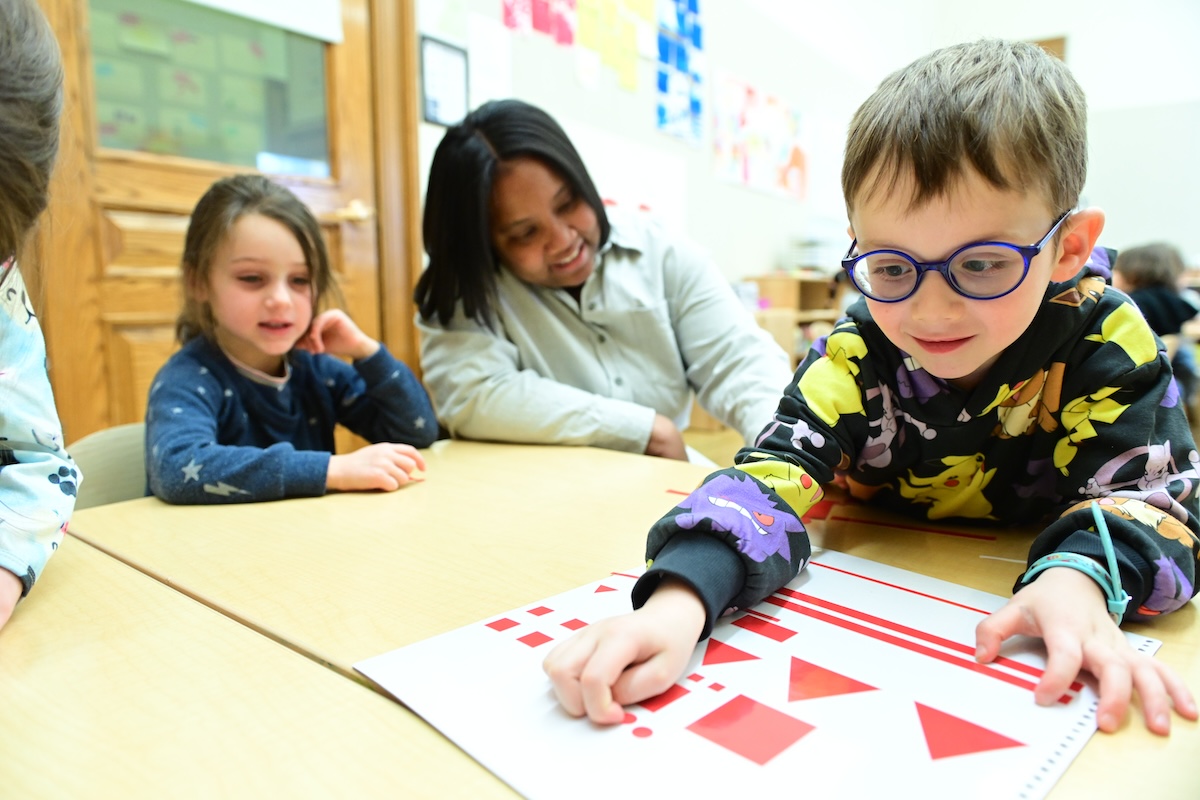
Underneath every rover built, every chair engineered, and every lab experiment is a strong foundation of mathematical reasoning.
Whether they’re swinging on the monkey bars or writing a paragraph, students engage in learning as an active, creative process — one that is playful, sparks inquiry, invites discourse, and empowers them to progress with independence. With this ethos in mind, ECFS students view math not as a set of formulas to memorize but as an integral part of everyday life.
This year, Ethical Culture Math Specialists Jen Cooley, Becky Weintraub, Nina Liu, and Larry McMillan have put their students through their paces in ways that serve to build understanding and conceptualization, not mere mindless practices.
From Kindergarten through 5th Grade, students embark on a journey that illuminates the links between abstract mathematical theories and real-world applications. It begins with simple ideas, such as shapes and numbers, and gradually builds logical reasoning through pattern activities. During morning meetings, partner games, and guided explorations, math is seamlessly integrated into each day’s activities, making mathematical thinking second nature.
One recent example is a project that Weintraub created for her 1st Grade students. Each week, Weintraub’s 1st Graders have scheduled “choice time.” This time is built in to allow students to engage more deeply with an interest, whether that be art, reading, writing, or, you guessed it, math!
This winter, during weekly choice time, students were introduced to Bee-Bots — small programmable robots — and tasked with programming them to move certain distances across the classroom floor. Estimating the distance the bots traveled along a taped path or the length of a book also got students actively thinking mathematically about units of measurement, estimation, and spatial reasoning.
One defining feature of our approach: an understanding that learning is more effective when it is collaborative, joyful, and based on shared responsibility.
Every step of the way, Weintraub asked students to explain the reasoning behind their predictions or their programming decisions, encouraging them to improve their math literacy. “From an early age, we deemphasize speed and instead try to develop fluency. Math is not an Olympic sport. Instead, we tell students, ‘Your thinking and work matter and deserve recognition. Doing your best means embracing challenges and recognizing the value in where you get stuck,’” shares Weintraub.
This methodology continues as students advance through each grade, beginning to explore multiplication, division, factors, multiples, and the properties of numbers. Real-world connections are the heart of the math curriculum, as students generalize mathematical concepts and apply them to interpret data, identify solutions to complex problems, and make informed decisions. Students are consistently encouraged to think critically and creatively, whether the challenge involves creating tables and graphs in Social Studies Workshop or engaging with exponential growth and division strategies.
Once students reach 3rd Grade, they can opt to join the Math Club, which provides a space for students with a particular interest in problem-solving to engage with extended challenges that extend beyond the classroom curriculum.
“Our older students have the skills and background knowledge to engage with a wider range of topics in mathematics than we can fit into math class,” says McMillan. “It is a lovely puzzle to determine if a particular group of students is better suited to investigate ciphers or applications of symmetry
in nature.”
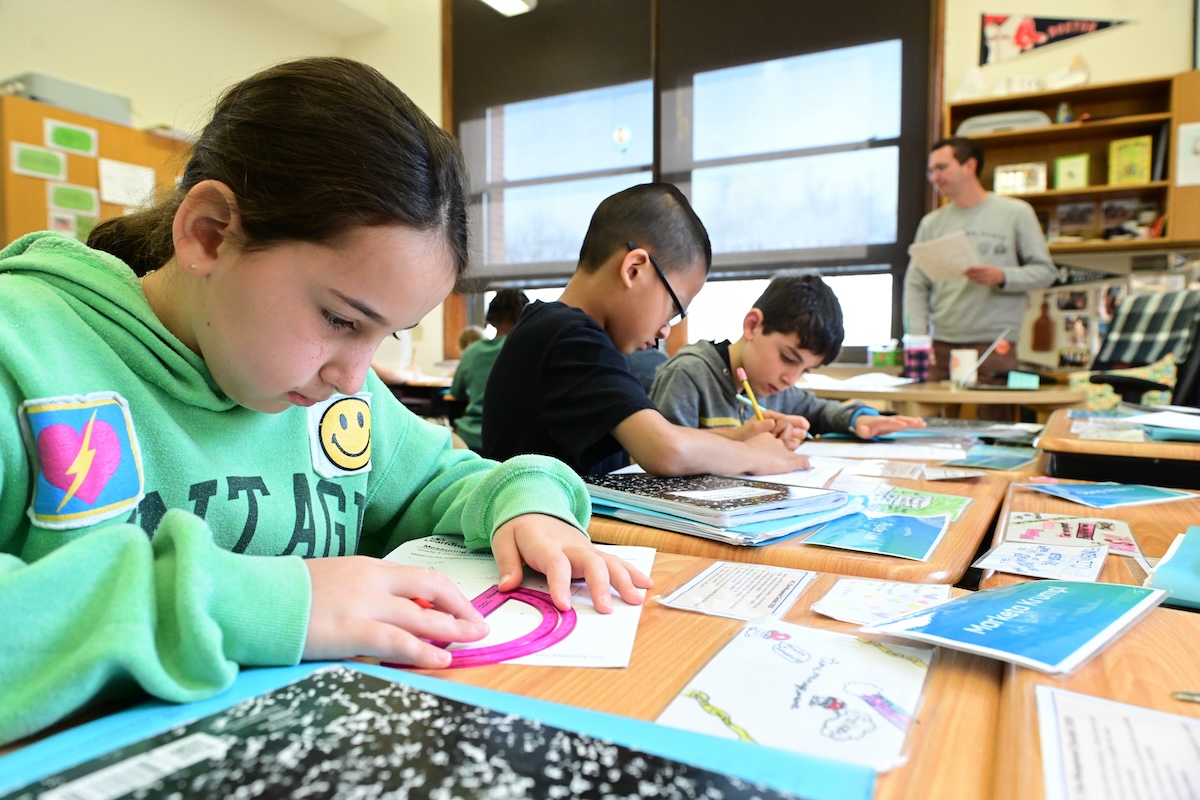
Recently, 5th Graders in the Math Club faced a geometrical challenge: building origami structures from Sonobe modules. These modular units enabled students to construct complex polyhedrons, including cubes and stellated octahedrons. While folding and assembling their designs, students practiced spatial reasoning and geometric principles, such as calculating the number of modules needed for each shape and considering relationships between different geometric forms. The 5th Graders brought this learning to the next level when they taught these concepts to 2nd Graders, further cementing their leadership within the school community.
These moments of stewardship, when older students step up as mentors and collaborators, are intentionally woven throughout the ECFS curriculum and offer a powerful reminder of one defining feature of our approach: an understanding that learning is more effective when it is collaborative, joyful, and based on shared responsibility.
“Learning by doing is a precept at ECFS, and the 5th Graders consistently show their commitment to such work,” shares McMillian. “But if you asked them, they would tell you it was for fun.”
This interdisciplinary approach allows students to interact with math in surprising ways. Through real-world inquiry, collaborative learning challenges, and a supportive environment, our teachers cultivate confident problem solvers who are comfortable with complexity, lead with curiosity, and take mathematical thinking with them far beyond the classroom walls.
At ECFS, students learn to solve real-world challenges through what they study and how they engage with it. Throughout their time at our School, students experience a joyful, inquiry-based approach to math, early exposure to ethical and cutting-edge technology, experiential engineering lessons, and rigorous science and research offerings. STEM education across each division cultivates resilience, independence, and innovation, preparing students not only to excel in college but also to step into the future with vision, purpose, and integrity.
